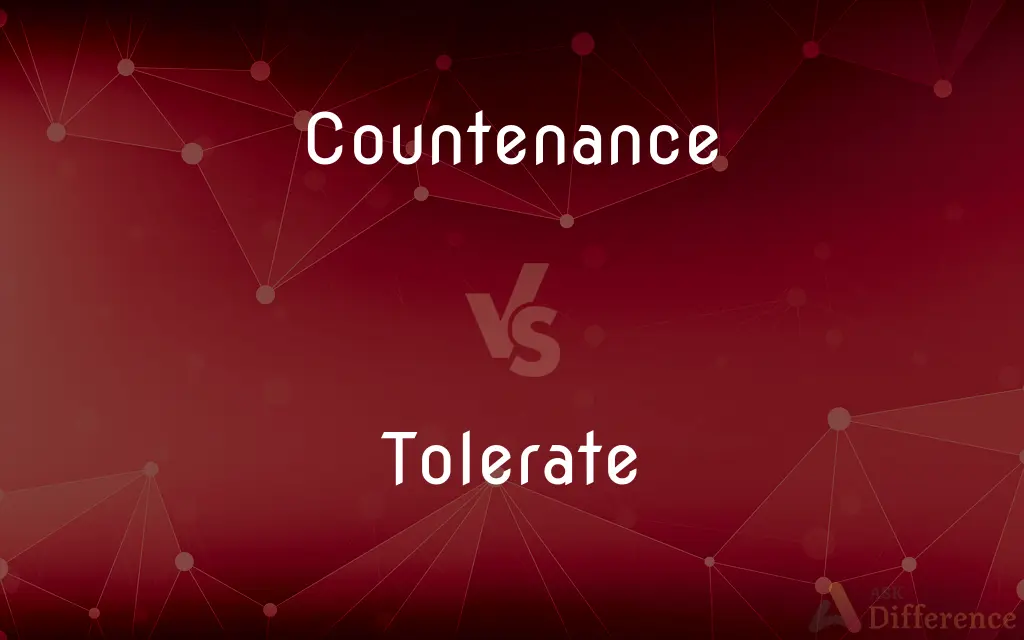Countenance vs. Tolerate — What's the Difference?
By Tayyaba Rehman & Maham Liaqat — Updated on May 8, 2024
"Countenance" refers to approving or supporting an action or idea, implying a positive endorsement; "tolerate" means to allow something without interference, often without approval.

Difference Between Countenance and Tolerate
Table of Contents
ADVERTISEMENT
Key Differences
"Countenance" implies a level of endorsement or support, often used when someone not only accepts but also positively regards a certain behavior or idea. Whereas "tolerate" suggests a more passive acceptance, allowing something to happen or exist without interference, but not necessarily supporting or agreeing with it.
To countenance something can involve active encouragement or promotion, showing a favorable attitude towards it. On the other hand, to tolerate often indicates putting up with something undesirable or disagreeable without taking action against it.
In terms of emotional involvement, countenancing often involves a positive emotional engagement or commitment to the object or idea being supported. In contrast, tolerating generally implies detachment or resignation, often accompanied by a lack of enthusiasm.
Countenance is also a formal term, commonly used in diplomatic, social, or leadership contexts to express open support or approval. Conversely, tolerate is used more broadly and can apply to a wide range of scenarios from personal to social and political.
The implications of countenancing something can be more significant, as it often involves moral or ethical endorsement. Tolerating, however, mainly implies a pragmatic approach to dealing with issues, suggesting endurance rather than acceptance.
ADVERTISEMENT
Comparison Chart
Definition
Approve or support with a positive endorsement
Allow the presence or occurrence without interference
Emotional Involvement
Often involves positive emotional engagement
Implies detachment or resignation
Implications
Involves moral or ethical endorsement
Suggests endurance without acceptance
Usage Context
Formal, often in diplomatic or leadership settings
Broad, applicable in various scenarios
Level of Acceptance
High, with active encouragement or promotion
Low, accepting presence without support
Compare with Definitions
Countenance
The appearance conveyed by a person's face.
Her calm countenance belied the stress she felt.
Tolerate
To allow the existence, presence, practice, or act without prohibition or hindrance.
He decided to tolerate the disturbances as long as they remained non-violent.
Countenance
To exhibit a specific expression or demeanor.
He was asked to maintain a serious countenance during the ceremony.
Tolerate
To bear or endure something painful or difficult patiently.
He tolerated the pain without complaint.
Countenance
To approve, support, or encourage.
The administration decided to countenance the new educational reforms.
Tolerate
To endure without repugnance; put up with.
She tolerated the annoying noise for the sake of peace.
Countenance
To give or express approval or permission.
The law does not countenance any exceptions in this case.
Tolerate
In medicine, to accept or be capable of something without adverse effects.
The patient was able to tolerate the medication well.
Countenance
To confront with a steady look.
She could not countenance her opponent without feeling a twinge of fear.
Tolerate
To recognize and respect (others' beliefs, practices, etc.) without sharing them.
The teacher taught students to tolerate differing opinions.
Countenance
Appearance, especially the expression of the face
The question left him with a puzzled countenance.
Tolerate
Allow the existence, occurrence, or practice of (something that one dislikes or disagrees with) without interference
A regime unwilling to tolerate dissent
Countenance
The face or facial features.
Tolerate
Be capable of continued subjection to (a drug, toxin, or environmental condition) without adverse reaction
Lichens grow in conditions that no other plants tolerate
Countenance
A look or expression indicative of encouragement or of moral support.
Tolerate
To refrain from interfering with or prohibiting (something undesirable or outside one's own practice or beliefs); allow or permit
The president will not tolerate any deviation from stated policy.
Countenance
Support or approval.
Tolerate
To recognize and respect (the rights, beliefs, or practices of others).
Countenance
(Obsolete) Bearing; demeanor.
Tolerate
To accept or be patient regarding (something unpleasant or undesirable); endure
Tolerated his insults for weeks.
Countenance
To give sanction or support to; tolerate or approve
The college administration will not countenance cheating.
Tolerate
(Medicine) To have tolerance for (a substance or pathogen).
Countenance
Appearance, especially the features and expression of the face.
Tolerate
(transitive) To allow or permit without explicit approval, usually if it is perceived as negative.
The party tolerated corruption within its ranks.
Countenance
Favour; support; encouragement.
Tolerate
(transitive) To bear, withstand.
I can tolerate working on Saturday, but not Sunday.
The elevator can tolerate up to 360 kilograms.
Countenance
(obsolete) Superficial appearance; show; pretense.
Tolerate
To suffer to be, or to be done, without prohibition or hindrance; to allow or permit negatively, by not preventing; not to restrain; to put up with; as, to tolerate doubtful practices.
Crying should not be tolerated in children.
We tolerate them because property and liberty, to a degree, require that toleration.
Countenance
Calm facial expression, composure, self-control.
Tolerate
Put up with something or somebody unpleasant;
I cannot bear his constant criticism
The new secretary had to endure a lot of unprofessional remarks
He learned to tolerate the heat
She stuck out two years in a miserable marriage
Countenance
(transitive) To tolerate, support, sanction, patronise or approve of something.
The cruel punishment was countenanced by the government, although it was not officially legal.
Tolerate
Recognize and respect (rights and beliefs of others);
We must tolerate the religions of others
Countenance
Appearance or expression of the face; look; aspect; mien.
So spake the Son, and into terror changedHis countenance.
Tolerate
Have a tolerance for a poison or strong drug or pathogen;
The patient does not tolerate the anti-inflammatory drugs we gave him
Countenance
The face; the features.
In countenance somewhat doth resemble you.
Tolerate
Allow the presence of or allow (an activity) without opposing or prohibiting;
We don't allow dogs here
Children are not permitted beyond this point
We cannot tolerate smoking in the hospital
Countenance
Approving or encouraging aspect of face; hence, favor, good will, support; aid; encouragement.
Thou hast made him . . . glad with thy countenance.
This is the magistrate's peculiar province, to give countenance to piety and virtue, and to rebuke vice.
Countenance
Superficial appearance; show; pretense.
The election being done, he made countenance of great discontent thereat.
Countenance
To encourage; to favor; to approve; to aid; to abet.
This conceit, though countenanced by learned men, is not made out either by experience or reason.
Error supports custom, custom countenances error.
Countenance
To make a show of; to pretend.
Which to these ladies love did countenance.
Countenance
The appearance conveyed by a person's face;
A pleasant countenance
A stern visage
Countenance
Formal and explicit approval;
A Democrat usually gets the union's endorsement
Countenance
The human face (`kisser' and `smiler' and `mug' are informal terms for `face' and `phiz' is British)
Countenance
Consent to, give permission;
She permitted her son to visit her estranged husband
I won't let the police search her basement
I cannot allow you to see your exam
Common Curiosities
How does countenance relate to expressions?
The term "countenance" is also used to describe the expression on a person's face, reflecting their mood or emotions.
What are the ethical implications of countenancing versus tolerating?
Countenancing something can involve ethical implications since it signifies approval. Tolerating, while less involved, does not necessarily convey approval and is more about enduring or allowing without support.
Is tolerance always a passive action?
Tolerance often involves a passive approach, allowing or enduring something without interference, but it does not necessarily involve active support or encouragement.
How does one show they countenance something?
Showing countenance can involve verbal expressions of approval, supportive actions, or even non-verbal cues that align with approval and support.
What does it mean to countenance an idea?
To countenance an idea means to approve, support, or encourage it openly.
Can one tolerate something they countenance?
Typically, if one countenances something, it goes beyond mere tolerance to imply endorsement, which includes a positive attitude rather than just acceptance.
Is it possible to countenance something without fully understanding it?
While it's possible to show superficial support, true countenance generally involves a clear understanding and genuine approval of the matter at hand.
What could be a situation where countenance is necessary?
Countenance might be necessary in leadership or diplomatic scenarios where showing explicit approval or support can guide or influence behaviors and decisions positively.
How do personal values influence one's capacity to tolerate?
Personal values deeply influence what an individual chooses to tolerate, as these values define what one finds acceptable or bearable.
Can a person tolerate something they disagree with?
Yes, tolerating often means enduring or allowing something one disagrees with or finds unpleasant, without taking action to stop or change it.
What is the difference between tolerating pain and countenancing it?
Tolerating pain means enduring it without necessarily accepting it as positive, whereas countenancing pain would imply a level of acceptance or even endorsement, which is not typical.
Why is tolerance important in a diverse society?
Tolerance is crucial in a diverse society as it allows different beliefs, practices, and behaviors to coexist peacefully, despite disagreements or differences.
What are the limits of tolerance in social contexts?
The limits of tolerance in social contexts typically arise when the tolerated behavior or idea significantly harms others or disrupts social harmony.
What role does cultural context play in determining what is tolerable or countenanced?
Cultural context plays a significant role in shaping what behaviors, ideas, or practices are tolerated or countenanced, reflecting the community's values and norms.
Can tolerance be a sign of strength?
Yes, tolerance can be seen as a sign of strength as it involves patience, understanding, and sometimes resilience in the face of adversity or disagreement.
Share Your Discovery

Previous Comparison
Bugle vs. Flugelhorn
Next Comparison
Dial vs. KnobAuthor Spotlight
Written by
Tayyaba RehmanTayyaba Rehman is a distinguished writer, currently serving as a primary contributor to askdifference.com. As a researcher in semantics and etymology, Tayyaba's passion for the complexity of languages and their distinctions has found a perfect home on the platform. Tayyaba delves into the intricacies of language, distinguishing between commonly confused words and phrases, thereby providing clarity for readers worldwide.
Co-written by
Maham Liaqat















































